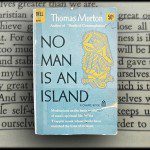 “Everything healthy, everything certain, everything holy, if we can find such things, they all need to be emphasized and articulated. For this it is necessary that there be communication between the hearts and minds of men, communication and not the noise of slogans or the repetition of cliches. Communication is becoming more and more difficult, and … speech is in danger of perishing or being perverted in the amplified noise of beasts…. There is therefore it seems to me every reason why we should attempt to cry out to one another and comfort one another, in so far as this may be possible, with the truth of Christ and also with the truth of humanism and reason. For faith cannot not be preserved if reason goes under, and the Church cannot survive if man is destroyed: that is to say if his humanity is utterly debased and mechanized, while he himself remains on earth as the instrument of enormous and unidentified forces like those which press us inexorably to the brink of cataclysmic war.”
“Everything healthy, everything certain, everything holy, if we can find such things, they all need to be emphasized and articulated. For this it is necessary that there be communication between the hearts and minds of men, communication and not the noise of slogans or the repetition of cliches. Communication is becoming more and more difficult, and … speech is in danger of perishing or being perverted in the amplified noise of beasts…. There is therefore it seems to me every reason why we should attempt to cry out to one another and comfort one another, in so far as this may be possible, with the truth of Christ and also with the truth of humanism and reason. For faith cannot not be preserved if reason goes under, and the Church cannot survive if man is destroyed: that is to say if his humanity is utterly debased and mechanized, while he himself remains on earth as the instrument of enormous and unidentified forces like those which press us inexorably to the brink of cataclysmic war.”
– Thomas Merton (Cold War Letter 3)
__________________________________________________________
My family has started spending time at our church’s ESL program most Monday nights. I’m typically in with the kids, while my wife is helping as a conversation partner with the grown ups. I make two excuses for this: First, I have rock and roll hearing, which is to say, when there’s background noise I struggle. Too many years playing loud guitars. Second, I have trouble with accents. Some people are good at understanding accents, some are not. I’m in the latter category. So I play games with the kiddos while I’m there.
I’ve been wondering, however, if there’s a third reason: I’m somewhat dependent upon, if not outright in love with language. I have such admiration for these friends who come on Monday nights to study English so that they can continue to make their way in our society. I cannot image what it would be like to be plopped down in a new country, and to have to make a living without the ability to articulate my thoughts without constant effort and translation… if language became a constant struggle.
I was born to talk, discuss, read, and write – all of which involve articulation of some sort. I’m a verbal processor, which means I often don’t know what I really think about a subject or issue until I’m able to sit with people and discuss it, or at spend some time trying to write about it. And I am constantly writing whether it be blog posts or articles, books or sermons. I naturally gravitate toward language.
At the same time, I am very much influenced by contemplative spirituality. Folks like Eugene Peterson, Thomas Merton, Richard Rohr and many other mystics taught me new way to connect with God when my old ways had run dry. Among these influences, or maybe more particularly among those who are equally influenced by them, I sometimes sense an underlying bias against the never ending flow of words coming from folks like me. This phenomenon is not always, but sometimes, accompanied by the notion that the mystical is somehow superior to, or prior to any sort of articulation. Shut up and pray, maybe is the message I often perceive.
The whole purpose of centering prayer, a discipline that I practice regularly and so appreciate, is meant to help us to an experience of the presence of God through prayer that is no longer mediated through language – it is a fleeing from the many words to the one word that can mediate God’s presence of God to you personally, and then to push even further on to a place in which words are no longer necessary. Getting the mind out of the way so that the body can receive an awareness of the presence of God dwelling within us through the Holy Spirit is the object of the enterprise, and is an essential practice if we are to chase the contemplative life. This is what I talked about in last week’s post. We need silence.
So I sometimes struggle with the necessity and merit of words. I often wonder if all these words are really necessary. I even feel judged at times by those who always want to point to a more contemplative or mystical place, as though my endless talking and writing is simply a waste of time, or at least an exercise of majoring in minors. When I’m in that place, I often read or re-read this quote from Thomas Merton, and am reminded of the importance of articulation. He reminds me how important words are, and that maybe the real trouble is less with the multiplicity of words, and more with the multiplicity of meaningless, debasing, and coercive words. Slogans. Kitsch.
Merton reminds us that reason is not the enemy, “For faith cannot not be preserved if reason goes under.” Words and the many forms of communication upon which we constantly rely are not the enemy, for there is “every reason why we should attempt to cry out to one another and comfort one another, in so far as this may be possible, with the truth of Christ.”
Reaching for the divine is not something that is averse to language, words, reason, or articulation. There is a sense in that to retreat from the mind is also an impossibility, and one that is essentially dehumanizing in that we can never truly separate the body, the mind, the soul, and the spirit without doing violence to the person. These are just different ways of naming what it means to be a human being, and they are, in the end, integrally connected. Body, mind, soul, and spirit must be constantly integrated if we are to find wholeness.
So I’m not ready to bail on words quite yet, or reason, or writing for that matter. As Merton says, “Everything healthy, everything certain, everything holy, if we can find such things, they all need to be emphasized and articulated.” In the struggle to become fully human as human was meant to be, maybe we really can use all the good words we can get.












